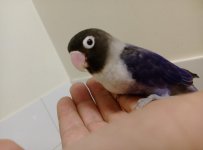ForEvaBuzzed
New member
- Jul 7, 2018
- 4
- 0
hi my female peachfaced lovie has just broken the others beak but not the whole thing (just a fair slice off the side). how do i stop her doing this? i've got them separated for now but they want to be near each other. thing is they have and still do get along well but out of nowhere she will attack him. she has been nesting for a long time 2 months or more but it hasn't been much of a problem before just the last 2-3 days. she would have fits now and then which were just her telling him off nothing like now. she is always aggressive to us he is the oppisite. could it be the difference in species? i added a pic of the male as i forget what kind he is. you can see abit of beak poking out and he is bleeding but you cant see it well. had blu3 (female) for two yrs and schwifty (male) for about 9 months. please help .............leaving page open just watching a movie will check back in an hour and 1/2 ish
Attachments
Last edited:
